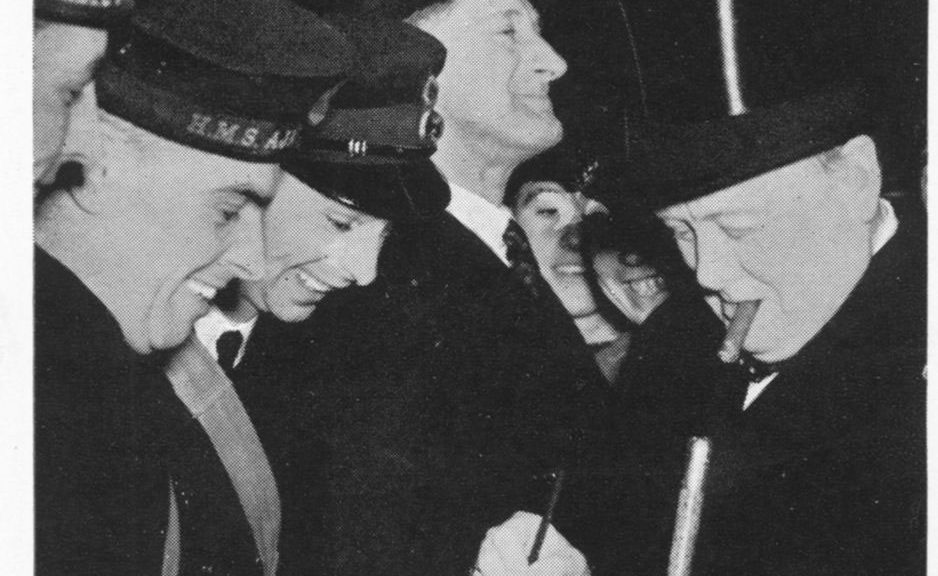
When Presidents and Prime Ministers Would Walk Among Us
There was a time, in a long-ago and innocent age, when national leaders would walk about unaccompanied by security. Sometimes, they would even walk alone.
Four such episodes came to mind last week which exemplify this vanished era. Questions arrived from colleagues about Churchill: his encounters with Canadian soldiers and his North Carolina connections. Then The New York Times published a retrospective on Woodrow Wilson, during the 1918 Paris Peace Conference. This was remindful of a fourth episode, involving Harry Truman. The sadness is that none of these could have happened in, the last fifty years. Maybe longer.
Walk in Paris: Woodrow Wilson, 1918
The Municipal Council of Paris gave President Wilson the keys to the City, but they neglected to present him with what is far more essential, a good map book, with which to find his way about the city’s intricate streets. And so he enjoyed the privileges of his new citizenship by getting lost.
Anxious friends of the President need not be worried, however, for he was found by two small boys who pointed out the way for him. The President and Mrs. Wilson started out unaccompanied one morning for a walk. From the time they left the Hôtel Murat until they returned, they were recognized by no one but the two young Paris urchins.
They were enjoying their incognito walk so much that they neglected to take note of the wanderings of Paris streets. Not sure where they were, they stopped to ask the French boys the right direction. The response was very prompt and courteous. Then, to the surprise of the President and Mrs. Wilson, who did not think they were recognized, two small hands came out under the capes the boys were wearing: “And now, Mr. President, won’t you shake hands with us?”
The hand-shaking was cordial on both sides, and Pierre and Jean went away with something to tell their grandchildren.
—Reported by the International Herald Tribune, reprinted 2018
Walk in Kent: Winston Churchill, 1941
Kenneth B. Smith, past president of Canada’s Hastings and Prince Edward Regimental Officers Association, told a humorous anecdote: Robert Morrison of B Company was on roving duty one evening at Chartwell in the summer of 1941 when he saw Churchill, who had gotten away from London for one of those rare weekends at his country home. Morrison saluted.
“Why didn’t you challenge me, Canada?” Churchill growled.
“I know who you are, sir,” replied Morrison.
“Oh, how do you know me?,” asked the Prime Minister.
“By your cigar, bald head, double chin, short neck and fat belly, sir,” answered Morrison.
“But don’t forget, the Germans have bald men with short necks and fat bellies who smoke cigars,” said Churchill.
“You’re right sir,” answered Morrison, “but they would do up the bottom button on the vest.”
Morrison’s logic “delighted the Prime Minister, who went chuckling into the twilight.”
Morrison’s last line was explained by Col. Strome Galloway of Ottawa: “The young Canadian soldier was very perceptive to realize that Englishmen, but not Germans, leave undone the bottom button of their waistcoats (not ‘vests,’ which in England means undershirts.) When King Edward VII became so paunchy he could not do up the bottom button of his waistcoat, and had to appear in public before his tailor could make the necessary adjustments, his entourage immediately undid theirs so as to follow the new Royal fashion.”
—Reported by the Globe and Mail (1984)
Walk in Casablanca: Winston Churchill, 1943
At Casablanca, where they shared several dinners, the Prime Minister kept General George Patton up very late telling stories before Churchill returned alone to his quarters near the Anfa Hotel. He had insisted nobody accompany him as it was only 3am and he wished to walk.
Near the hotel he was halted by an American sentry, a farm boy from North Carolina, who challenged the Prime Minister and then called: “Corporal of the Guard! I have a fellow down here who claims he’s the Prime Minister of Great Britain. I think he is a goddam liar.”
The Corporal of the Guard arrived and recognized Mr. Churchill. The incident pleased the Prime Minister greatly, for he told it afterwards on many occasions.
—Harry H. Semmes, Portrait of Patton (1955).
Walk in Washington: Harry Truman, ca. 1950
As President, Truman felt more than ever a need to see and make contact with what he called the everyday American. And always he felt better for it.
On an evening in Washington, on one of his walks, he had decided to take a look at the mechanism that raised and lowered the middle span of the Memorial Bridge over the Potomac. Descending some iron steps, he came upon the bridge tender, eating his evening supper out of a tin bucket.
Showing no surprise that the President of the United States had climbed down the catwalk and suddenly appeared before him, the man said, “You know, Mr. President, I was just thinking about you.” It was a greeting Truman adored and never forgot.
—David McCullouch, Truman (2003).
One wonders….
….most of all about what must have been the incandescent conversation between Churchill and Patton. Did Patton explain that he had been present, in another life, at the Battle of Carthage in 149 B.C.? What did Patton think of Churchill’s part in the Battle of Omdurman, 1,749 years later? We are only reminded once again, of how much of the Churchill canon was never recorded.
See also
“Churchill’s Common Touch,” in five parts, beginning here.






